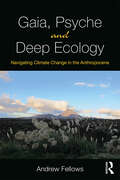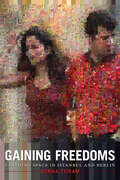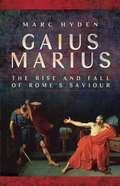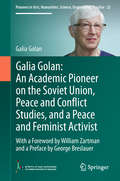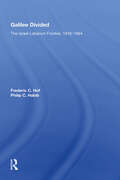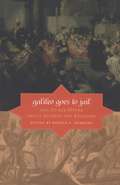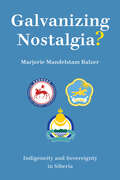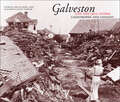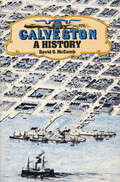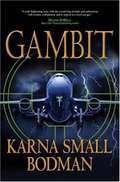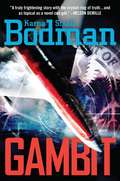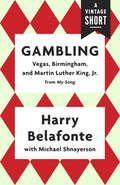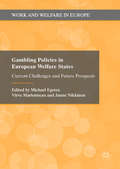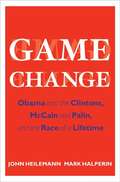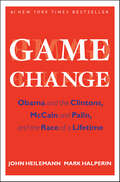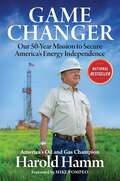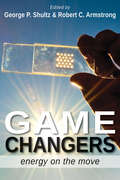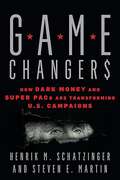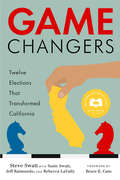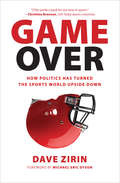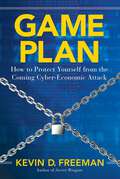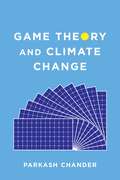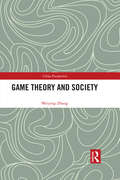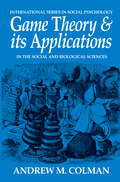- Table View
- List View
Gaia, Psyche and Deep Ecology: Navigating Climate Change in the Anthropocene
by Andrew FellowsWinner of the Scientific & Medical Network Book Prize 2019! In Gaia, Psyche and Deep Ecology: Navigating Climate Change in the Anthropocene, Andrew Fellows uniquely connects Earth systems, Jungian and philosophical approaches to the existential threats that we face today. He elucidates the psychological basis of our dysfunctional relationship with nature, thereby offering a coherent framework for transforming this in our personal and professional lives. Demonstrating the imperative for new ideas that transcend the status quo, Fellows tackles unprecedented 21st century challenges such as climate change through his interdisciplinary approach. Fellows proposes a worldview, informed by depth psychology, which radically contradicts the prevailing shibboleths of unlimited economic growth, dominion over outer nature and negation of our inner nature. To accommodate a broad readership, he first introduces the Anthropocene and sufficient basics of systems dynamics, Gaia theory and analytical psychology before exploring the mind-matter conundrum. He then correlates the structure, dynamics, contents and pathology of Gaia and of psyche, critiques the Western Zeitgeist as midlife crisis and establishes parallels between deep ecology and psychological individuation. This ground-breaking synthesis of Gaia theory, analytical psychology and deep ecology reveals synergies which show how we can, and why we must, relinquish anthropocentrism in order to survive sustainably as equals in and with the natural world. Combining Jungian theory with other cutting-edge disciplines to inform, inspire and heal, this book is essential reading not only for Jungian analysts, students and scholars, but for all—including professionals in Earth systems science, environmental philosophy and ecopsychology—who realise that ‘business as usual’ is no longer an option.
Gaining Access: Congress and the Farm Lobby, 1919-1981
by John Mark HansenThrough a comprehensive analysis of American agricultural politics in the past half-century, Gaining Access shows when, how, and why interest groups gain and lose influence in the policy deliberations of the United States Congress. By consulting with policy advocates, John Mark Hansen argues, lawmakers offset their uncertainty about the policy stands that will bolster or impede their prospects for reelection. The advocates provide legislators with electoral intelligence in Washington and supportive propaganda at home, earning serious consideration of their policy views in return. From among a multitude of such informants, representatives must choose those they will most closely consult.
Gaining Freedoms: Claiming Space in Istanbul and Berlin
by Berna TuramGaining Freedoms reveals a new locus for global political change: everyday urban contestation. Cities are often assumed hotbeds of socio-economic division, but this assessment overlooks the importance of urban space and the everyday activities of urban life for empowerment, emancipation, and democratization. Through proximity, neighborhoods, streets, and squares can create unconventional power contestations over lifestyle and consumption. And through struggle, negotiation, and cooperation, competing claims across groups can become platforms to defend freedom and rights from government encroachments. Drawing on more than seven years of fieldwork in three contested urban sites--a downtown neighborhood and a university campus in Istanbul, and a Turkish neighborhood in Berlin--Berna Turam shows how democratic contestation echoes through urban space. Countering common assumptions that Turkey is strongly polarized between Islamists and secularists, she illustrates how contested urban space encourages creative politics, the kind of politics that advance rights, expression, and representation shared between pious and secular groups. Exceptional moments of protest, like the recent Gezi protests which bookend this study, offer clear external signs of upheaval and disruption, but it is the everyday contestation and interaction that forge alliances and inspire change. Ultimately, Turam argues that the process of democratization is not the reduction of conflict, but rather the capacity to form new alliances out of conflict.
Gaius Marius: The Rise and Fall of Rome's Saviour
by Marc HydenGaius Marius was one of the most remarkable and significant figures of the late Roman Republic. At a time when power tended to be restricted to a clique of influential families, he rose from relatively humble origins to attain the top office of consul. He even went on to hold the post an unprecedented seven times. His political career flourished but was primarily built on military success. First serving in the Numantine War in Spain, he later rose to high command and brought a long-running war in North Africa to a successful conclusion, bringing the Numidian King Jurgurtha back in chains. His return was timely as northern barbarian tribes threatened Italy and had previously defeated several Roman armies. Marius reformed and retrained the Republic's forces and decisively defeated the invaders that had easily overpowered his predecessors. Marius' subsequent career was primarily that of an elder statesman, but it was dominated by his rivalry with his erstwhile subordinate, Sulla, which ultimately led to the latter's bloody coup. Marius, once hailed as the savior of Rome, eventually became a desperate fugitive, literally fleeing for his life from his pursuers. However, after several harrowing brushes with death, Marius seized an opportunity to return to Rome and mete out justice to his enemies, which tarnished his once-enviable reputation.
Galia Golan: An Academic Pioneer on the Soviet Union, Peace and Conflict Studies, and a Peace and Feminist Activist (Pioneers in Arts, Humanities, Science, Engineering, Practice #22)
by Galia GolanThis is an autobiography of an unusual and versatile woman, focusing on her academic development and achievements as well as her international activism. In addition to a discussion of the origins and path of the author's academic work and activism (for peace and for women's rights), that deals with the author's work in US intelligence and immigration to Israel in the 1960s, the volume includes ground-breaking articles from the different, often controversial areas of her academic specializations (Czechoslovak communism, Soviet foreign policy; peace studies, the Arab-Israeli conflict; women's rights). The volume also includes photos of the author at work and in action.- The book offers an inside look at a lifetime of courageous activities and ground breaking intellectual pursuits of a woman who was a leader in her academic field and in the struggle for peace and for women's rights. - The included texts themselves shed light on important topics, both past and present, including the Israeli-Arab Conflict and also the issue of women and peace.
Galilee Divided: The Israel-lebanon Frontier, 1916-1984
by Frederic C HofThis monograph looks at the problems on and around the southern boundary of Lebanon from the time it was first established by the French and British after World War I. The author turns to the Zionist thirst for the waters of the Litani River, the impotence and neglect of the southern region and its Shia inhabitants on the part of all Lebanese governments, the coming of the PLO, Israel's policies and actions on grounds of security, and finally the war of 1982 and the unsettled issues left in its wake.
Galileo goes to Jail and other Myths about Science and Religion
by Ronald L. NumbersA new generation of historians both of science and of the church began to examine episodes in the history of science and religion through the values and knowledge of the actors themselves. Now Ronald Numbers has recruited the leading scholars in this new history of science to puncture the myths, from Galileo's incarceration to Darwin's deathbed conversion to Einstein's belief in a personal God who didn't play dice with the universe.
Galvanizing Nostalgia?: Indigeneity and Sovereignty in Siberia
by Marjorie Mandelstam BalzerGalvanizing Nostalgia? explores critical questions for the survival of Russia in its nominally federal form. Will Russia fall apart along the lines of its internal republics, as did the Soviet Union? Based on cultural anthropology field and historical research in major republics of Eastern Siberia—Sakha (Yakutia), Buryatia, and Tyva (Tuva)—this book highlights Indigenous concerns about self-determination.Marjorie Mandelstam Balzer suggests that a fragile and disorganized dynamic of nested sovereignties has developed within Russia. Ecology activism has grown, given new threats to the environment and accelerating climate challenges, especially in the Arctic. Focus on strategically chosen republics enables comparing and contrasting interethnic relations, language politics, and the salience of gender, demography, resource competition, environmental degradation, and increased spirituality. Republics vary in their neocolonial relationships to Moscow authorities. Some local leaders, such as a politicized shaman, use nostalgia for cultural achievements to galvanize citizens. Since the Soviet Union collapsed, cultural and political revitalization have been relatively more viable, although still difficult, in areas where Siberians have their own republics.
Galveston and the 1900 Storm: Catastrophe and Catalyst
by Patricia Bellis Bixel Elizabeth Hayes TurnerSpur Award Nominee: How Galveston, Texas, reinvented itself after historic disaster: “A riveting narrative . . . Absorbing [and] well-illustrated.” —Library JournalThe Galveston storm of 1900 reduced a cosmopolitan and economically vibrant city to a wreckage-strewn wasteland where survivors struggled without shelter, power, potable water, or even the means to summon help. At least 6,000 of the city's 38,000 residents died in the hurricane. Many observers predicted that Galveston would never recover and urged that the island be abandoned. Instead, the citizens of Galveston seized the opportunity, not just to rebuild, but to reinvent the city in a thoughtful, intentional way that reformed its government, gave women a larger role in its public life, and made it less vulnerable to future storms and flooding.This extensively illustrated history tells the full story of the 1900 Storm and its long-term effects. The authors draw on survivors’ accounts to vividly recreate the storm and its aftermath. They describe the work of local relief agencies, aided by Clara Barton and the American Red Cross, and show how their short-term efforts grew into lasting reforms. At the same time, the authors reveal that not all Galvestonians benefited from the city’s rebirth, as African Americans found themselves increasingly shut out from civic participation by Jim Crow segregation laws. As the centennial of the 1900 Storm prompts remembrance and reassessment, this complete account will be essential and fascinating reading for all who seek to understand Galveston’s destruction and rebirth.Runner-up, Spur Award for Best Western Nonfiction—Contemporary, Western Writers Of America
Galveston: A History (Fred Rider Cotten Popular History Ser. #15)
by David G. McCombA colorful history of the island city on Texas&’s Gulf Coast and its survival through times of piracy, plague, civil war, and devastating natural disaster. On the Gulf edge of Texas between land and sea stands Galveston Island. Shaped continually by wind and water, it is one of earth&’s ongoing creations, where time is forever new. Here, on the shoreline, embraced by the waves, a person can still feel the heartbeat of nature. And yet, for all the idyllic possibilities, Galveston&’s history has been anything but tranquil. Across Galveston&’s sands have walked Indians, pirates, revolutionaries, the richest men of nineteenth-century Texas, soldiers, sailors, bootleggers, gamblers, prostitutes, physicians, entertainers, engineers, and preservationists. Major events in the island&’s past include hurricanes, yellow fever, smuggling, vice, the Civil War, the building of a medical school and port, raids by the Texas Rangers, and, always, the struggle to live in a precarious location. Galveston: A History is an engrossing account that also explores the role of technology and the often contradictory relationship between technology and the city, providing a guide to both Galveston history and the dynamics of urban development.
Gambit
by Karna Small BodmanKarna Small Bodman's first thriller, Checkmate, was praised for its compelling authenticity and page-turning plot. Now Bodman, a former director of the National Security Council, returns with another gripping thriller that reads like tomorrow's headlines. American planes are being shot out of the sky, and no one knows how or why. Three commercial jets have gone up in flames. In each crash, nobody reported seeing anything in the sky and nothing showed up on the radar. No planes. No missiles. Dr. Cameron Talbot, a world-famous expert on missile-defense systems, believes that a new stealth technology is being used in these attacks. With the country in a panic and the economy taking a nosedive, the White House orders the beautiful young scientist to protect America's endangered airways. The assignment places Cammy in mortal jeopardy as she finds herself stalked by nameless assassins. Who is behind the threat? Islamic jihadists? The big drug cartels? None of the usual suspects have claimed responsibility for the crashes. As Cammy races against time to develop a defense against the mystery weapon, she comes to suspect that the downed planes are only the opening gambit in an ambitious campaign of conquest that could change the world's balance of power forever.
Gambit
by Karna Small BodmanKarna Small Bodman’s first thriller, Checkmate, was praised for its compelling authenticity and page-turning plot. Now Bodman, a former director of the National Security Council, returns with another gripping thriller that reads like tomorrow’s headlines.
Gambling
by Harry BelafonteAn eBook short. A participant's portrait of Martin Luther King, Jr. and the Civil Rights Movement, from Harry Belafonte's memoir of activism and entertainment, My Song.Birmingham, Alabama in 1963 was one of the most segregated cities in America. It had segregated lunch counters, restrooms, and water fountains. It had a nickname, "Bombingham," for the homemade bombs detonated by local Klansmen. And it had Eugene "Bull" Connor, a racist police chief with a hair-trigger temper. It was here that Dr. King and his advisers, Harry Belafonte among them, rolled the dice on an enormous action which would rejuvenate the civil rights movement. Harry Belafonte is one of America's greatest entertainers and also one of our most profoundly influential activists. During the 1960s he befriended MLK and began using his celebrity in support of civil rights and other social causes. This is Belafonte's personal story of fame, performance, and a lasting friendship. From stages in Vegas to political salons in New York, to the streets of Birmingham and letters from Birmingham Jail, Belafonte gives the reader a unique view of Martin Luther King, Jr. at one of his finest moments.
Gambling Policies in European Welfare States: Current Challenges and Future Prospects (Work and Welfare in Europe)
by Michael Egerer Virve Marionneau Janne NikkinenThis edited book draws on a cross-cultural and historical lens to theoretically and practically analyse gambling regulations and the use of gambling revenue. It takes on a broad spectrum of perspectives, from the origin of the money, to the regulators, operators and beneficiaries of gambling, and looks at the interests, networks and power relations involved.This multidisciplinary collection elicits a shift in analysis, shedding light on a broader societal, historical and economic view of gambling and gambling policies, by its attention to implicit networks of power, influential legislation, gambling provision and infrastructure.Gambling Policies in European Welfare States will be of interest to students and scholars alike who are seeking cross-national and interdisciplinary analyses of welfare, politics, sociology and economics.
Game Change: Obama and the Clintons, McCain and Palin, and the Race of a Lifetime
by Mark Halperin John Heilemann"This shit would be really interesting if we weren't in the middle of it."--Barack Obama, September 2008. In 2008, the presidential election became blockbuster entertainment. Everyone was watching as the race for the White House unfolded like something from the realm of fiction. The meteoric rise and historic triumph of Barack Obama. The shocking fall of the House of Clinton--and the improbable resurrection of Hillary as Obama's partner and America's face to the world. The mercurial performance of John McCain and the mesmerizing emergence of Sarah Palin. But despite the wall-to-wall media coverage of this spellbinding drama, remarkably little of the real story behind the headlines has yet been told. In Game Change, John Heilemann and Mark Halperin, two of the country's leading political reporters, use their unrivaled access to pull back the curtain on the Obama, Clinton, McCain, and Palin campaigns. How did Obama convince himself that, despite the thinness of his résumé, he could somehow beat the odds to become the nation's first African American president? How did the tumultuous relationship between the Clintons shape--and warp--Hillary's supposedly unstoppable bid? What was behind her husband's furious outbursts and devastating political miscalculations? Why did McCain make the novice governor of Alaska his running mate? And was Palin merely painfully out of her depth--or troubled in more serious ways? Game Change answers those questions and more, laying bare the secret history of the 2008 campaign. Heilemann and Halperin take us inside the Obama machine, where staffers referred to the candidate as "Black Jesus." They unearth the quiet conspiracy in the U.S. Senate to prod Obama into the race, driven in part by the fears of senior Democrats that Bill Clinton's personal life might cripple Hillary's presidential prospects. They expose the twisted tale of John Edwards's affair with Rielle Hunter, the truth behind the downfall of Rudy Giuliani, and the doubts of those responsible for vetting Palin about her readiness for the Republican ticket--along with the McCain campaign staff's worries about her fitness for office. And they reveal how, in an emotional late-night phone call, Obama succeeded in wooing Clinton, despite her staunch resistance, to become his secretary of state. Based on hundreds of interviews with the people who lived the story, Game Change is a reportorial tour de force that reads like a fast-paced novel. Character driven and dialogue rich, replete with extravagantly detailed scenes, this is the occasionally shocking, often hilarious, ultimately definitive account of the campaign of a lifetime.
Game Change: Obama and the Clintons, McCain and Palin, and the Race of a Lifetime
by Mark Halperin John HeilemannThe gripping inside story of the 2008 presidential election, by two of the best political reporters in the country.“It’s one of the best books on politics of any kind I’ve read. For entertainment value, I put it up there with Catch 22.” —The Financial Times“It transports you to a parallel universe in which everything in the National Enquirer is true….More interesting is what we learn about the candidates themselves: their frailties, egos and almost super-human stamina.” —The Financial Times“I can’t put down this book!” —Stephen ColbertGame Change is the New York Times bestselling story of the 2008 presidential election, by John Heilemann and Mark Halperin, two of the best political reporters in the country. In the spirit of Richard Ben Cramer’s What It Takes and Theodore H. White’s The Making of the President 1960, this classic campaign trail book tells the defining story of a new era in American politics, going deeper behind the scenes of the Obama/Biden and McCain/Palin campaigns than any other account of the historic 2008 election.
Game Changer: Our Fifty-Year Mission to Secure America's Energy Independence
by Harold HammGame Changer is the story of one man&’s fifty-year journey doing battle with the conventional wisdom and in the process helping to restore America as an energy superpower. A day doesn&’t go by without energy in the headlines. From banning gas stoves to prices at the pump to threats to the world&’s energy supplies, energy is front and center. Most of what we are hearing is high emotion, low-fact misinformation offered by folks who have no clue what they are talking about. Game Changer is the story of Harold Hamm and his fifty-year journey battling conventional wisdom and, in the process, helping restore America as an energy superpower. How did he do it? With horizontal drilling. What Hamm did was game changing—for his country and the world. In Game Changer, Hamm explains: Why American Energy Independence is the most important policy to guarantee our long-term economic and national security. How the conversion to natural gas for electricity production in the US has led to the largest declines in emissions in the industrialized world. Why much of the energy narrative is distorted by money, politics, activism, and virtue-signaling. Why the so-called &“energy crisis&” in America is self-inflicted. We&’ve been relentlessly told that oil and natural gas is the enemy, that humanity&’s very existence depends on its extinction. Yet our whole world—your world—runs on it. Game Changer invites you to learn the real story, the story we all need to hear, told through the common-sense eyes of the man who has led what he calls the American Energy Renaissance. If you care about your future, and the future of your kids and grandkids, read this book.
Game Changers: Energy on the Move
by Edited by George Shultz and Robert ArmstrongIt is becoming increasingly obvious that the United States needs reliable and inexpensive energy to propel our economy and protect our national security interests. Game Changers presents five research and development efforts from American universities that offer a cheaper, cleaner, and more secure national energy system. Drawing from the efforts of the MIT Energy Initiative (MITEI) and other leading university research centers, the book describes some of the energy innovations that will transform our future: natural gas from shales, solar photovoltaics, grid-scale electricity storage, electric cars, and LED lighting. For each of these innovations, the authors detail what is available today, what is near at hand, and what is on the horizon. In addition, they show how extreme energy reliability and performance demands put the United States military at the leading edge of driving energy innovations, and survey potentially game-changing energy technologies currently being put into use by the U.S. Army, Navy, Marine Corps, and Air Force, on base and in forward deployment. The more choices our laboratories put on the table, the less constrained we are in using them to reach the things we really care about—health, family, business, culture, faith, and delight. This is what game changers are ultimately about.
Game Changers: How Dark Money and Super PACs Are Transforming U.S. Campaigns
by Henrik M. Schatzinger Steven E. MartinThe first book of its kind to provide an accessible overview of the changes Citizens United brought to political campaigns and political representation, it combines rigorous academic research with many examples of ongoing trends from the campaign trail. Even though campaign finance involves complex legal issues, the book is set up to be engaging for both students of political campaigns and American politics, as well as civically engaged citizens who want to learn more about outside groups and their impact on campaigns and public policy. The book makes the case that Super PACs and dark money groups qualify as game changers of political campaigns not only because of what these groups can do independently from candidates and their increasing ability to match or even exceed candidates’ financial resources, but because their actions influence the political incentives and strategies of candidates and political parties. We also point out evidence that those changes go beyond campaigns—they affect how legislators represent their constituents; how donors put pressure on lawmakers to adopt certain legislation after outside groups supported them; how the regulatory environment can benefit donors as a result of actions taken by federal agencies to repeal or dismantle existing laws; and how extreme positions by politicians can be incentivized and progress stalled when megadonors and outside groups reward political ideologues. Our hope is that this text inspires readers to draw their own conclusions about the effects the U.S. Supreme Court’s Citizens United decision has had and continues to have on the inner workings of American democracy. Some may even feel moved to take action that will empower ordinary citizens who want to have more of a voice in the democratic process. Given the high stakes associated with elections and the political changes they can bring due to the highly polarized political environment we live in, we believe that this book will add value to not only courses focusing on campaigns, elections, interest groups, and political communication, but also other courses such as introductory American Government courses.
Game Changers: Twelve Elections That Transformed California
by Bruce Cain Steve Swatt Susie Swatt Jeff Raimundo Rebecca LaVallyThe latest CHS Book Award winner examines California's history through the prism of twelve elections that forever changed the state. Drawing from a wealth of primary sources, including new interviews conducted by the authors, each chapter explores one election (Leland Stanford's gubernatorial race, the initiative that mandated term limits, and the Los Angeles Aqueduct Bond Measure, to name a few), revealing the forces behind the choices made at the polls and the consequences that carry over to this day. The authors offer thought-provoking interpretation rooted in decades of experience in journalism, public-policy analysis, and political consulting at the state Capitol. Through their perspectives we better understand the intricate game played in Sacramento by contenders such as the bespectacled and brilliant progressive reformer Hiram Johnson, iconoclastic muckraker-turned-candidate Upton Sinclair, and Proposition 13 author Howard Jarvis, with his zealous oratory and machete approach to tax reform. By focusing on elections, the authors show that Californians' voices are as powerful and transformative as the tectonic forces beneath us.
Game Over: How Politics Has Turned the Sports World Upside Down
by Dave Zirin&“Enlightening&” essays on athletes, activism, and the important role sports plays in our society (Publishers Weekly). Sportscaster Howard Cosell dubbed it &“rule number one of the jockocracy&”: sports and politics just don&’t mix. But in truth, some of our most important debates about class, race, religion, sex, and the raw quest for political power are played out both on and off the field. From the NFL lockout and the role of soccer in the Arab Spring to the Penn State sexual abuse scandals and Tim Tebow&’s on-field genuflections, this timely and hard-hitting new book from the &“conscience of American sports writing&” offers new insights and analysis of headline-grabbing sports controversies (The Washington Post). It explores the shady side of the NCAA; the explosive 2011 MLB All-Star Game; and why the Dodgers crashed and burned. It covers the fascinating struggles of gay and lesbian athletes to gain acceptance, female athletes to be more than sex symbols, and athletes everywhere to assert their collective bargaining rights as union members. Dave Zirin also illustrates the ways that athletes are once again using their exalted platforms to speak out and reclaim sports from the corporate interests that have taken it hostage. In Game Over, he cheers the victories—but also reflects on how far we have yet to go. &“A book that no thinking sports fan can afford to miss.&” —Jonathan Mahler, author of Ladies and Gentlemen, The Bronx Is Burning
Game Plan: How to Protect Yourself from the Coming Cyber-Economic Attack
by Kevin D. FreemanGame Plan is the first "how to" investment handbook of its type. It will explain the emerging risks and provide a complete game plan of response for investors at all levels. Freeman will explain that there is no "one size fits all" solution as events are happening quickly and the challenges can morph suddenly. Just as a football team must plan for a variety of offensive strategies and attacks, investors must be prepared to strategically adjust. This book provides the game plan to respond and succeed.In Game Plan you'll learn...The proper use of gold in your investment strategyHow stocks should be deployed in your investment portfolioThe smart way to diversify your portfolioHow to decrease your bond holding vulnerabilityHow to judge a guarantor in guaranteed investmentsHow to avoid falling into the marketing hype for Hedge Fund scamsHow to find a properly trained investment advisorHow to advance wealth at the individual levelHow to win the global economic war
Game Theory and Climate Change
by Parkash ChanderDespite the growing consensus on the need for action to counteract climate change, complex economic and political forces have so far prevented international actors from making much headway toward resolving the problem. Most approaches to climate change are based in economics and environmental science; in this book, Parkash Chander argues that we can make further progress on the climate change impasse by considering a third approach—game theory.Chander shows that a game-theoretic approach, which offers insight into the nature of interactions between sovereign countries behaving strategically and the kinds of outcomes such interactions produce, can illuminate how best to achieve international agreements in support of climate-change mitigation strategies. Game Theory and Climate Change develops a conceptual framework with which to analyze climate change as a strategic or dynamic game, bringing together cooperative and noncooperative game theory and providing practical analyses of international negotiations. Chander offers economic and game-theoretic interpretations of both the Kyoto Protocol and the Paris Agreement and argues that the Paris Agreement may succeed where the Kyoto Protocol failed. Finally, Chander discusses the policy recommendations his framework generates, including a global agreement to support development of cleaner technologies on a global scale.
Game Theory and Society (China Perspectives)
by Weiying ZhangThe progress of society can only happen through interpersonal cooperation, because only cooperation can bring about mutual benefit, thus bringing happiness to each person. This should be our collective rationality, but we often see it conflicts with individual interests, which leads to the so-called "Prisoners’ Dilemma" and does not bring happiness to all. From a game theoretical perspective, this book addresses the issue of how people can cooperate better. It has two objectives. The first is to use common language to systematically introduce the basic methodologies and core conclusions of Game Theory, including the Nash equilibrium, multiple equilibriums, dynamic games, etc. Mathematics and theoretical models are used to the minimum necessary scope too, to make this book get access to ordinary readers with elementary mathematical training. The second objective is to utilize these methods and conclusions to analyze various Chinese social issues and institutional arrangements, with a focus on the reasons people exhibit non-cooperative behaviors as well as the institutions and cultures that promote interpersonal cooperation. In addition to economics, specialists in sociology, law, history, politics and management will also be attracted by this book for its insightful analysis on the issue of cooperation in these fields. Also, readers curious about Chinese society will benefit from this book.
Game Theory and its Applications: In the Social and Biological Sciences
by Andrew M. ColmanAndrew Coleman provides an accessible introduction to the fundamentals of mathematical gaming and other major applications in social psychology, decision theory, economics, politics, evolutionary biology, philosophy, operational research and sociology.
